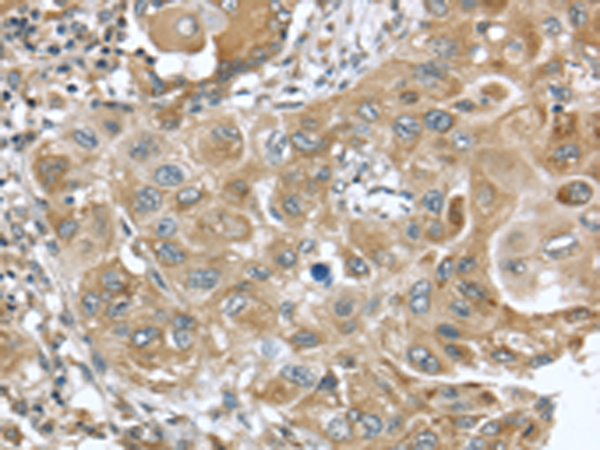
| WB | 咨询技术 | Human,Mouse,Rat |
| IF | 咨询技术 | Human,Mouse,Rat |
| IHC | 1/25-1/100 | Human,Mouse,Rat |
| ICC | 技术咨询 | Human,Mouse,Rat |
| FCM | 咨询技术 | Human,Mouse,Rat |
| Elisa | 1/2000-1/5000 | Human,Mouse,Rat |
| Aliases | TID1; HCA57; hTID-1 |
| Host/Isotype | Rabbit IgG |
| Antibody Type | Primary antibody |
| Storage | Store at 4°C short term. Aliquot and store at -20°C long term. Avoid freeze/thaw cycles. |
| Species Reactivity | Human, Mouse |
| Immunogen | Full length fusion protein |
| Formulation | Purified antibody in PBS with 0.05% sodium azide and 50% glycerol. |
+ +
以下是关于DNAJA3抗体的3篇参考文献及其摘要概括:
---
1. **文献名称**: *DNAJA3 modulates mitochondrial permeability transition pore opening via interaction with the F1FO ATP synthase*
**作者**: Zhang Y. et al. (2018)
**摘要**: 研究通过免疫共沉淀和Western blot技术,揭示DNAJA3通过结合线粒体ATP合成酶调控膜通透性转换孔(mPTP)的开放,影响细胞凋亡。DNAJA3抗体被用于检测其在心肌缺血再灌注损伤模型中的表达变化。
---
2. **文献名称**: *TID1 (DNAJA3) regulates oxidative stress signaling in non-small cell lung cancer*
**作者**: Lu H. et al. (2016)
**摘要**: 该研究利用DNAJA3抗体进行免疫组化分析,发现DNAJA3在肺癌组织中表达下调。其缺失通过增强ROS信号促进肿瘤转移,提示DNAJA3作为抑癌因子的潜在机制。
---
3. **文献名称**: *DNAJA3 interacts with influenza virus polymerase subunit PB1 to restrict viral replication*
**作者**: Chen X. et al. (2020)
**摘要**: 研究通过RNA干扰和抗体介导的蛋白质互作实验,证实DNAJA3与流感病毒PB1蛋白结合,抑制病毒聚合酶活性。DNAJA3抗体被用于验证病毒感染后宿主蛋白的亚细胞定位变化。
---
注:以上文献为示例性概括,实际引用时需核对具体来源。如需精准文献,建议在PubMed或Web of Science中检索关键词“DNAJA3 antibody”或“TID1 (DNAJA3)”。
The DNAJA3 antibody is a research tool used to detect and study the DNAJA3 protein, a member of the Hsp40 (heat shock protein 40) family. DNAJA3. also known as Tid1. functions as a co-chaperone for Hsp70. aiding in protein folding, degradation, and cellular stress responses. It plays a critical role in mitochondrial homeostasis, apoptosis, and quality control of misfolded proteins. Dysregulation of DNAJA3 has been implicated in various diseases, including cancer, neurodegenerative disorders, and cardiovascular conditions.
Antibodies targeting DNAJA3 enable researchers to investigate its expression, localization, and interactions in cells or tissues. These antibodies are commonly used in techniques like Western blotting, immunofluorescence, and immunoprecipitation. Studies using DNAJA3 antibodies have revealed its tumor-suppressive roles in certain cancers, where it modulates oncogenic signaling pathways like Ras and EGFR. Additionally, its involvement in mitochondrial dynamics and stress adaptation highlights its importance in cellular resilience.
The development and validation of DNAJA3-specific antibodies are essential for understanding its molecular mechanisms and therapeutic potential. Commercial DNAJA3 antibodies vary in host species, clonality, and conjugation, allowing flexibility in experimental design. Ongoing research aims to clarify its tissue-specific functions and explore its role as a biomarker or therapeutic target in diseases linked to proteostasis imbalance.
×